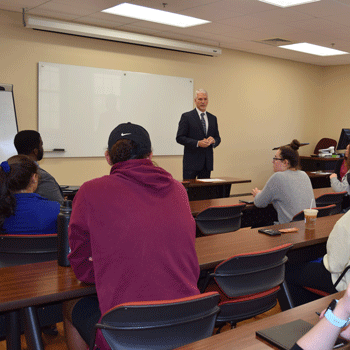
On Friday, March 6, students in Dr. Julie Brancale’s Introduction to Criminal Justice class were visited by Florida Senator Keith Perry, Chair of the Senate Criminal Justice Committee. Sen. Perry spoke with the class about several bills proposed during this year’s legislative session that were focused on criminal justice reform.
Sen. Perry discussed a number of initiatives related to juveniles, including expanding diversion programs to juvenile offenders beyond those who are only first-time misdemeanor offenders. Sen. Perry explained that this is one of a number of initiatives that the legislature is considering as they reevaluate how to provide tools to prosecutors and judges to provide opportunities for the rehabilitation of young offenders.
Also discussed was the often controversial issue of prisoner gain-time, or credit time for the sentence that a prisoner can earn while incarcerated. Presently, the law requires that prisoners serve at least 85% of their sentence. However, a number of bills before the legislature seek to reduce the mandatory portion of a sentence that must be served. Sen. Perry articulated a number of requirements within these bills, including that a prisoner must demonstrate productivity while incarcerated to merit receiving a reduction of his or her sentence. Sen. Perry also reviewed how prisons need to encourage prisoner productivity so that, when a prisoner leaves the prison environment, they have education and vocational skills to help them become productive members of society. Without vocational skills and education, the prisoner is, unfortunately, often destined to return to prison. Sen. Perry noted that this is because prisoners often become reliant on the structured environment of a correctional institution, making a minimal number of decisions on their own, but, when released, that structure is gone or significantly decreased, which is often extremely difficult for an inmate to adjust to without proper guidance.
Sen. Perry also encouraged the students to examine the actual text of bills under discussion by the legislature to determine what the bills seek to do or change in state law. For example, Sen. Perry noted that there were individuals who vocally opposed the use of inmate work details, but are often not aware that these details were both voluntary and sought after by inmates, as they provided an opportunity to leave the institutional environment while incarcerated. Sen. Perry pointed out that students should rely on direct research to understand issues, rather than making assumptions or relying on the conclusions of others.
Sen. Perry stated that researchers in the College of Criminology & Criminal Justice have been working with his Committee during the 2020 legislative session by forecasting any potential racial impact criminal justice legislation may have. College researchers have provided legislators with non-partisan, empirical data-driven “Racial and Ethnic Impact Statements” to help legislators understand the impact of prospective policy decisions. Over the course of the 2020 legislative session, the College provided Racial and Ethnic Impact Statements on ten Senate bills.
Sen. Perry has represented the 8th district of Florida, encompassing Alachua, Putnam, and part of Marion County in North Central Florida, since 2016. He also served in the Florida House of Representatives, representing the 22nd district from 2010 to 2012 and the 21st district from 2012 to 2016. In addition to serving as the Chair of the Criminal Justice Committee, Sen. Perry also serves as the Vice Chair of the Infrastructure and Security Committee. Further, he serves on the following subcommittees and committees: Appropriations Subcommittee on Criminal and Civil Justice, Appropriations Subcommittee on Transportation, Tourism, and Economic Development, Banking and Insurance Committee, Education Committee, and Joint Administrative Procedures Committee.

